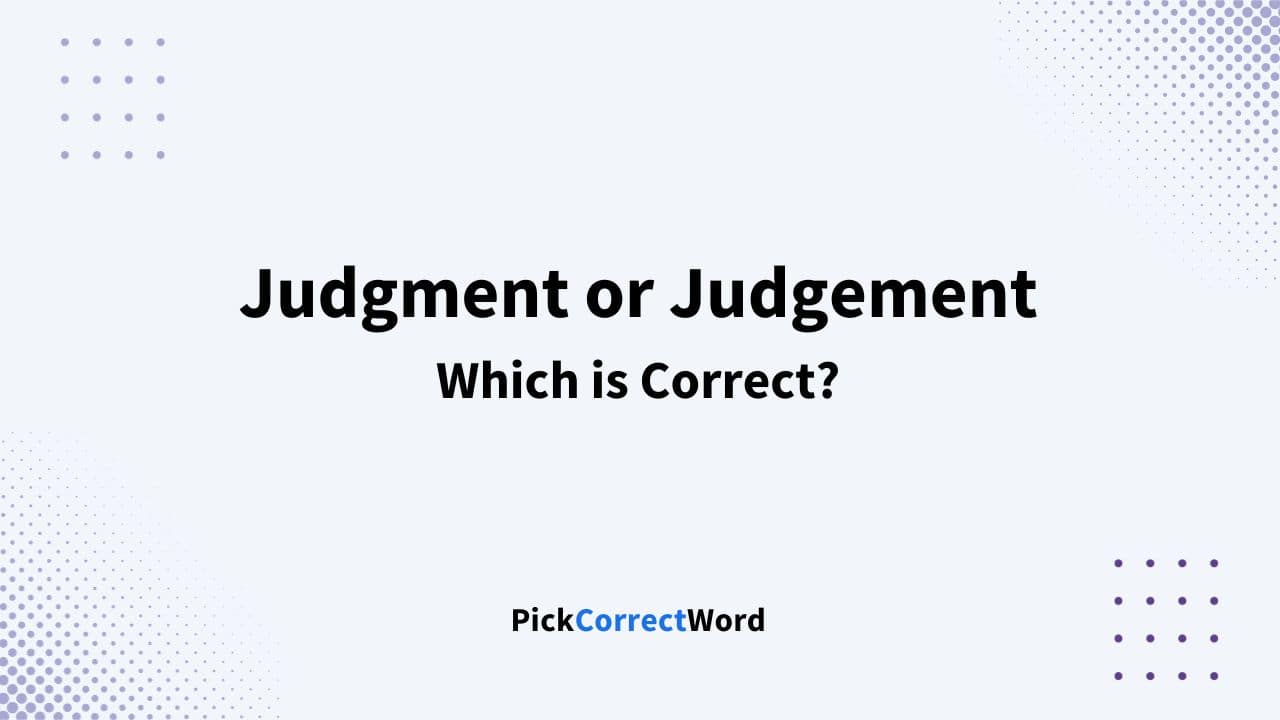When you want to share an opinion or make a choice, you often use the word ‘judgment’. This word is about being able to make thoughtful decisions or reach sensible conclusions.
But you might be unsure about how to spell it – should it be ‘judgement’ with an ‘e’, or ‘judgment’ without the ‘e’? This is a common mix-up because both spellings are used in different types of English.
In American English, ‘judgment’ (without the ‘e’) is the usual spelling.
On the other hand, British English prefers ‘judgement’ (with the ‘e’).
There’s no right or wrong between ‘judgement’ and ‘judgment’. The important thing is to be consistent in your writing and think about who will be reading it. Stick with one spelling throughout your piece to keep things clear and coherent.
Judgment or Judgement: Which is Correct?
Both “judgment” and “judgement” are correct spellings of the same word, and their usage depends on regional language norms.
The choice of spelling between “judgment” or “judgement,” depends on whether you are using British or American English.
British versus American English
- ‘Judgement’ is the correct spelling in British English
- ‘Judgment’ is the correct spelling in American English
When to Use Judgment?
In American English, “judgment” is the standard spelling.
The word “judgment” is used when you’re talking about making a decision or forming an opinion after looking at facts and evidence. It’s often used in legal situations, like when a judge makes a ruling, but it can also mean your personal ability to make decisions.
“Judgment” can also mean criticism or the skill to make thoughtful decisions or reach sensible conclusions.
You can use it in a moral or ethical way too, like when deciding between right and wrong. In American English, you’ll often see it spelled as “judgment”, while in British English, it’s usually spelled as “judgement”.
Examples:
- Legal Setting: “The judge’s final judgment in the case was that the defendant was not guilty.”
- Decision-Making: “Her judgment to invest in the technology sector proved to be very profitable.”
- Criticism: “He faced harsh judgment from his peers for his actions.”
- Considered Decisions: “The manager’s judgment to merge the two departments was based on extensive research.”
- Moral/Ethical Sense: “She always used her personal judgment to distinguish between right and wrong.”
When to Use Judgement?
On the other hand, “judgement” is usually used in British English. It’s perfectly fine to use when you’re writing for a British audience or following British English rules.
The meaning of “judgement” stays the same as described above, whether you’re writing in British English or American English.
Here are two examples of the use of the word judgement:
- Everyday British English: “Your judgement in this situation was impeccable.”
- British legal terms: “The jury returned a judgement in favor of the defendant.”
Synonyms for judgement/judgment
When you’re looking for other words to use instead of ‘judgement’ or ‘judgment,’ there are plenty of synonyms you can choose from to make your writing more interesting. Just make sure you pick a synonym that fits well with what you’re trying to say.
Here’s a simple list that shows some synonyms based on how relevant and similar they are:
Direct Synonyms:
- Verdict: Typically used in legal contexts to denote a decision made by a jury or judge.
- Opinion: Often implies a personal belief or conclusion about something or someone.
Synonyms Suggesting Decision-Making Ability:
- Discernment: This term emphasizes the ability to make good judgments by distinguishing between options.
- Wisdom: Suggests a depth of knowledge and experience that informs one’s judgments.
Synonyms Suggesting Formal Decisions:
- Decree: Official orders or decisions, especially one from the authority or a public body.
- Ruling: An authoritative decision or directive, usually by a judge.
Frequently Asked Questions
When you’re referring to religious texts like the Bible, is there a specific way to spell ‘judgment’?
For religious texts like the Bible, ‘judgment’ is typically the standard spelling utilized in many English translations.
Can you provide some everyday examples where the term ‘judgment’ is commonly used?
Everyday usage of the term ‘judgment’ includes expressions like “passing judgment” on an issue or commenting on someone’s “poor judgment” in decision-making.
What are the distinct definitions associated with the word ‘judgment’?
The word ‘judgment’ is associated with several definitions, including the ability to make considered decisions or come to sensible conclusions and a legal decision given by a judge or court.


